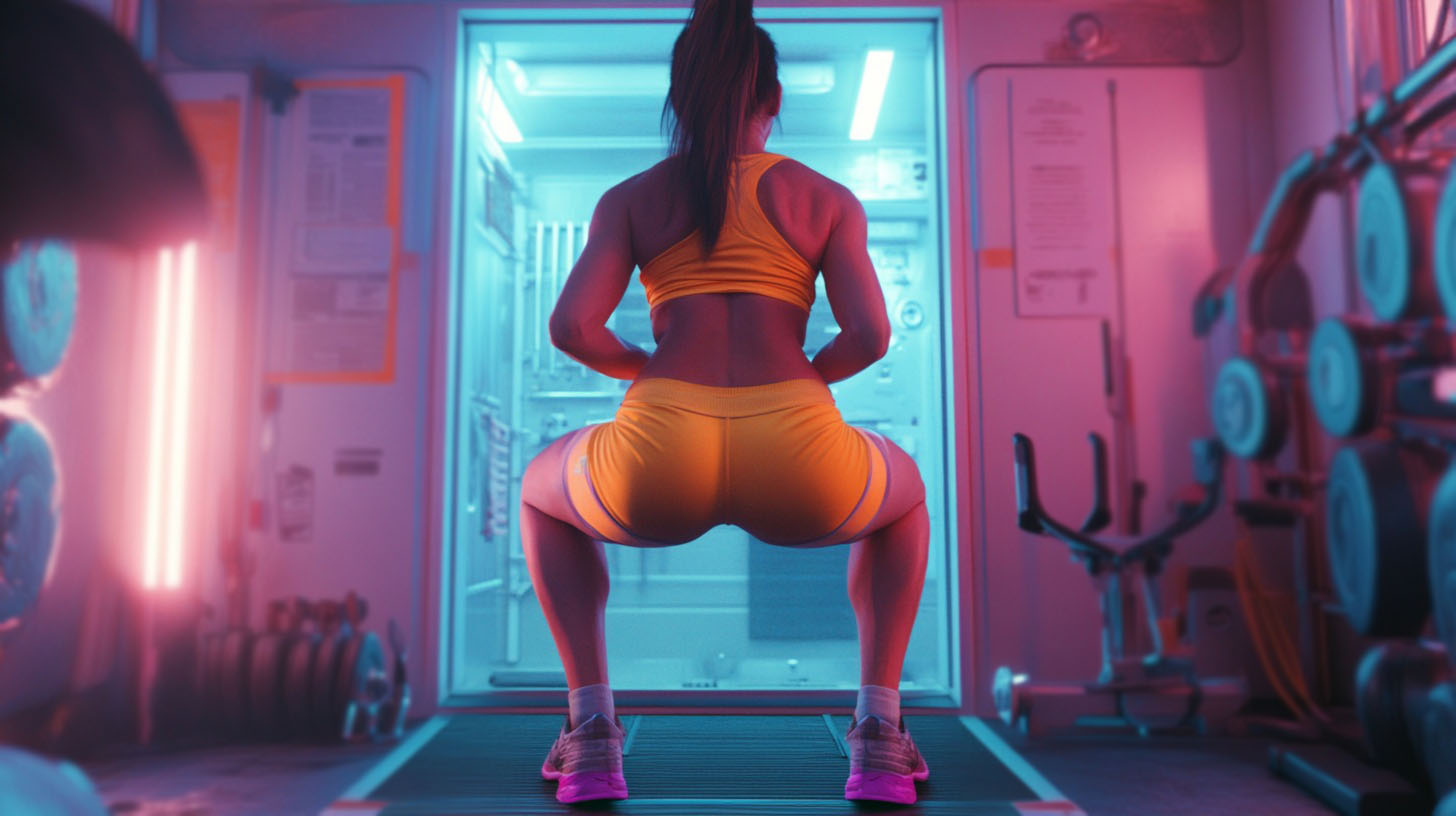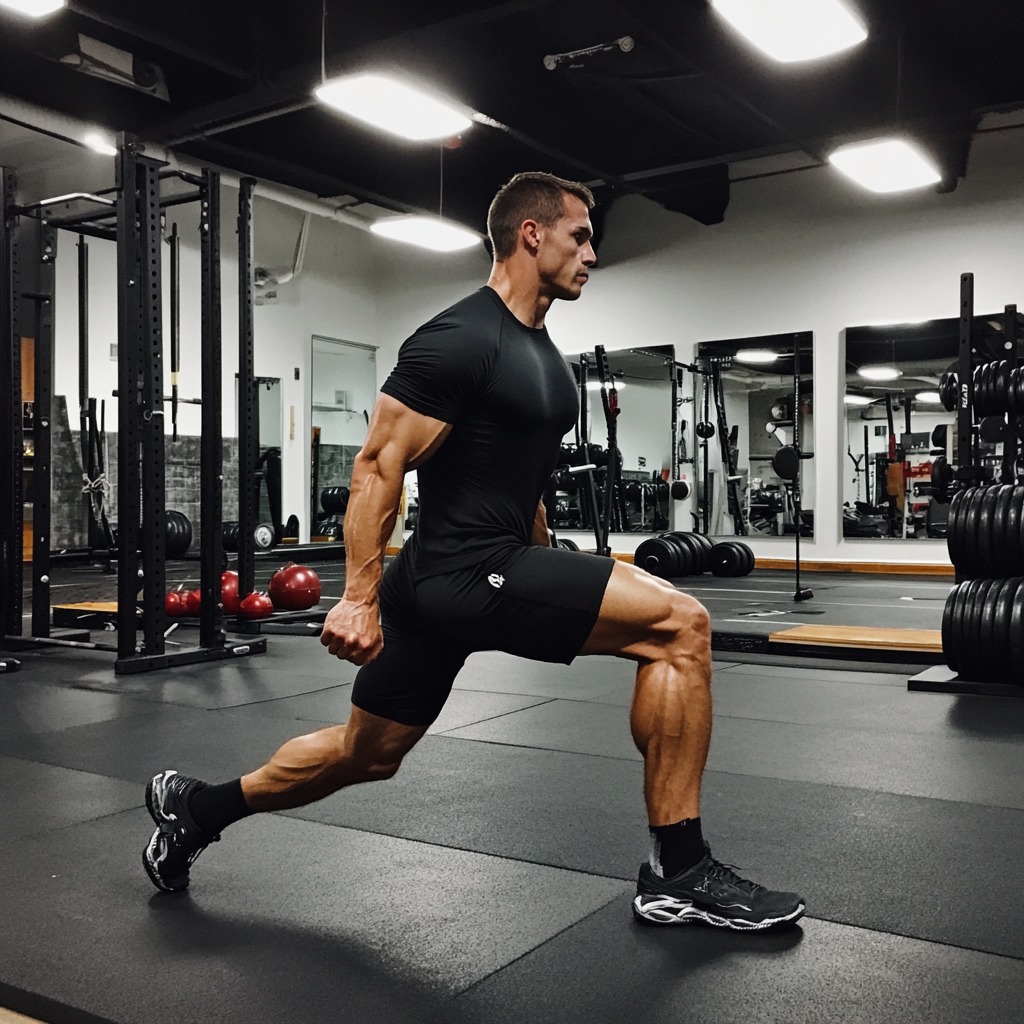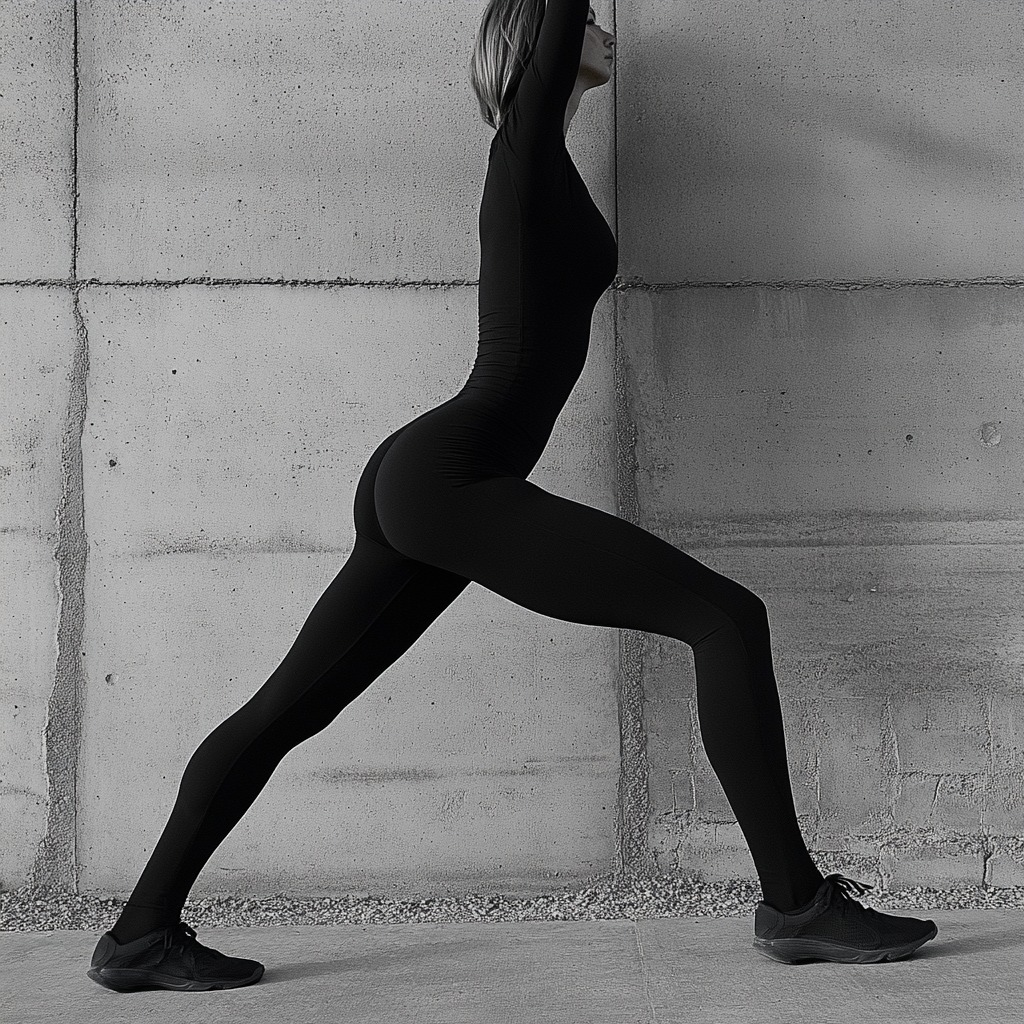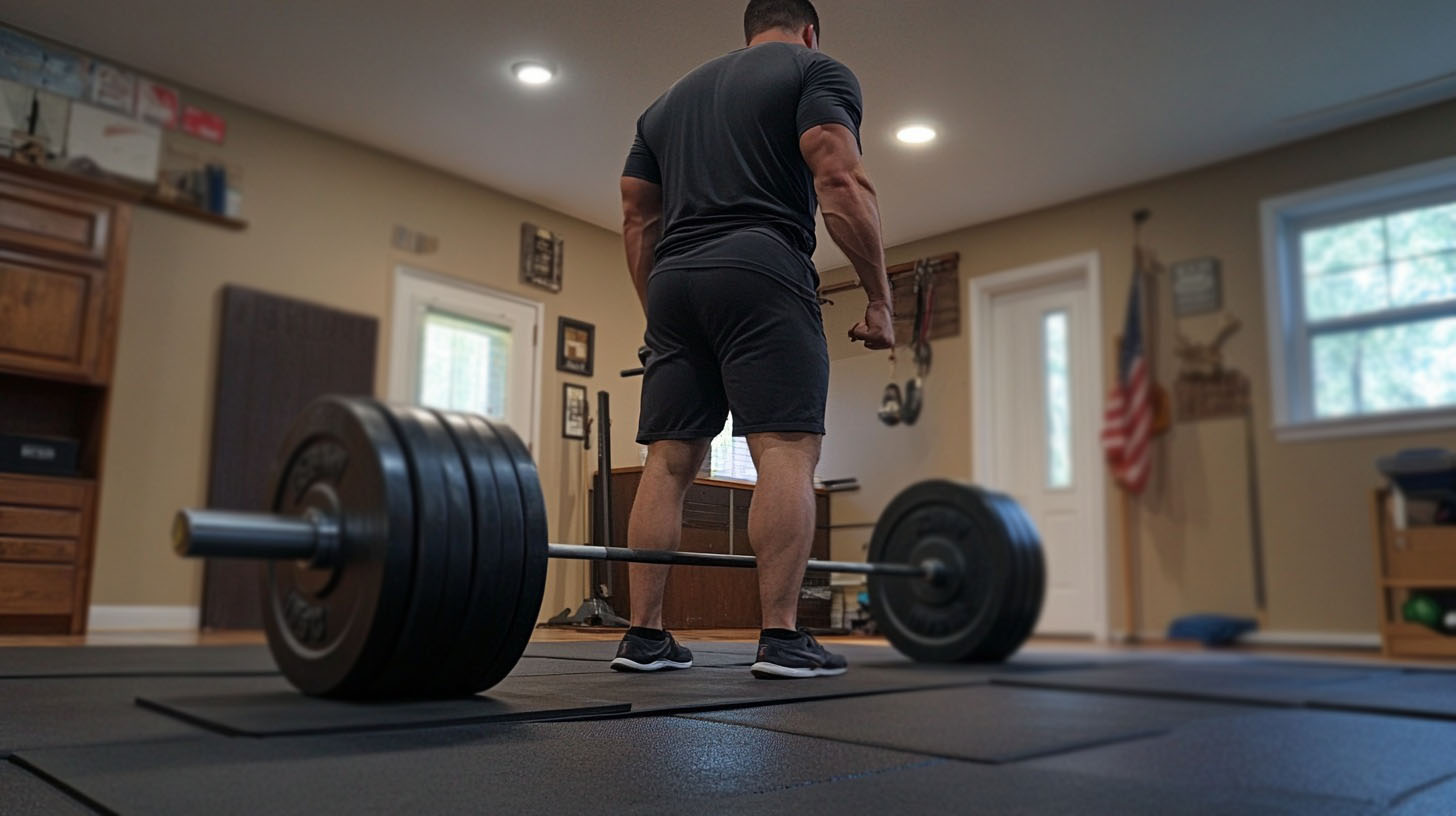Leg
presses
are
excellent
for
building
lower
body
strength,
but
not
everyone
has
access
to
a
leg
press
machine
at
home.
Fortunately,
there
are
effective
alternatives
that
can
deliver
similar
benefits
without
specialized
equipment.
The
best
leg
press
alternatives
for
home
workouts
target
the
same
muscle
groups,
including
the
quadriceps,
hamstrings,
and
glutes,
while
also
engaging
your
core
for
stability.
These
exercises
can
be
performed
with
minimal
equipment,
making
them
ideal
for
home
training
sessions.
1.
Squats

Bodyweight
Squats
Bodyweight
squats
are
an
excellent
starting
point
for
those
new
to
squatting.
Stand
with
your
feet
shoulder-width
apart,
toes
slightly
pointed
outward.
Lower
your
body
as
if
sitting
back
into
a
chair,
keeping
your
chest
up
and
core
engaged.
Aim
to
get
your
thighs
parallel
to
the
ground
or
lower.
Push
through
your
heels
to
return
to
the
starting
position.
Perform
3-4
sets
of
12-15
repetitions
to
build
endurance
and
proper
form.
To
increase
difficulty,
try:
-
Slowing
down
the
eccentric
(lowering)
phase -
Adding
a
pause
at
the
bottom
of
the
movement -
Performing
single-leg
squats
or
pistol
squats
Goblet
Squats
Goblet
squats
add
weight
to
the
basic
squat
movement,
increasing
resistance
and
muscle
engagement.
Hold
a
dumbbell
or
kettlebell
close
to
your
chest
with
both
hands,
elbows
pointing
down.
Stand
with
feet
slightly
wider
than
shoulder-width.
Lower
your
body,
keeping
your
back
straight
and
core
tight.
The
weight
will
help
you
maintain
balance
and
proper
form.
Key
points:
-
Keep
your
elbows
between
your
knees
at
the
bottom -
Maintain
a
neutral
spine
throughout
the
movement -
Start
with
a
lighter
weight
to
perfect
your
form
Overhead
Squats
Overhead
squats
challenge
your
stability
and
engage
your
entire
body.
Hold
a
barbell
or
lightweight
above
your
head
with
arms
fully
extended.
Your
feet
should
be
slightly
wider
than
shoulder-width
apart.
Lower
your
body
into
a
squat
position
while
keeping
the
weight
overhead.
This
exercise
requires
significant
shoulder
mobility
and
core
strength.
Benefits
include:
-
Improved
core
stability
and
balance -
Increased
shoulder
mobility
and
strength -
Enhanced
overall
body
coordination
Start
with
a
lightweight
or
even
a
broomstick
to
master
the
technique
before
progressing
to
heavier
loads.
2.
Lunges:

Forward
Lunges
Forward
lunges
primarily
engage
your
quadriceps,
hamstrings,
and
glutes.
To
perform
this
exercise:
-
Stand
with
your
feet
hip-width
apart. -
Take
a
large
step
forward
with
your
right
leg. -
Lower
your
body
until
both
knees
are
bent
at
90-degree
angles. -
Push
back
to
the
starting
position
and
repeat
with
the
left
leg.
Forward
lunges
help
improve
balance
and
stability
while
strengthening
your
leg
muscles.
They
also
enhance
hip
mobility
and
core
engagement.
You
can
hold
dumbbells
or
a
barbell
while
performing
the
exercise
to
increase
difficulty.
Start
with
2-3
sets
of
10-12
repetitions
per
leg.
Reverse
Lunges

Reverse
lunges
work
similar
muscles
as
forward
lunges
but
place
less
stress
on
your
knees.
Just
like
side
lunges,
they’re
an
excellent
option
if
you
have
knee
issues
or
want
to
vary
your
routine.
To
do
reverse
lunges:
-
Stand
with
your
feet
together. -
Step
backward
with
your
right
foot. -
Lower
your
body
until
both
knees
are
bent
at
90-degree
angles. -
Push
through
your
left
heel
to
return
to
the
starting
position.
This
variation
helps
improve
your
balance
and
coordination.
It
also
targets
your
glutes
more
intensely
than
forward
lunges.
Try
3
sets
of
8-10
repetitions
per
leg.
As
you
progress,
add
weights
or
increase
the
number
of
reps.
Walking
Lunges
Walking
lunges
combines
the
benefits
of
forward
lunges
with
continuous
movement,
providing
a
more
dynamic
workout.
They’re
great
for
improving
cardiovascular
fitness
and
leg
endurance.
To
perform
walking
lunges:
-
Start
with
your
feet
hip-width
apart. -
Take
a
large
step
forward
with
your
right
leg
and
lower
into
a
lunge. -
Instead
of
returning
to
the
starting
position,
bring
your
left
foot
forward
into
the
next
lunge. -
Continue
alternating
legs
as
you
move
forward.
This
exercise
challenges
your
balance
and
coordination
while
working
your
leg
muscles.
It’s
an
excellent
way
to
build
lower
body
strength
and
improve
your
overall
fitness.
Aim
for
2-3
sets
of
10-15
steps
per
leg.
As
you
get
stronger,
increase
the
distance
or
add
weights
to
make
the
exercise
more
challenging.
3.
Step-Ups
Traditional
Step-Ups
Traditional
step-ups
are
a
simple
yet
effective
exercise
for
strengthening
your
legs.
You’ll
need
a
sturdy
box,
bench,
or
step
to
perform
them.
Start
by
standing
in
front
of
the
elevated
surface.
Place
your
right
foot
firmly
on
top
of
it.
Push
through
your
right
heel
to
lift
your
body
up
until
your
right
leg
is
fully
extended.
Bring
your
left
foot
up
to
meet
the
right
foot
on
the
platform.
Slowly
lower
your
left
foot
back
down
to
the
starting
position.
This
completes
one
repetition.
Aim
for
3
sets
of
10-15
reps
per
leg.
As
you
progress,
you
can
increase
the
height
of
the
step
or
hold
dumbbells
to
add
resistance.
Lateral
Step-Ups
Lateral
step-ups
add
a
new
dimension
to
your
workout
by
targeting
your
outer
thighs
and
hips.
This
variation
helps
improve
stability
and
balance.
Begin
by
standing
sideways
next
to
your
chosen
platform.
Place
the
foot
closest
to
the
step
onto
its
surface.
Push
through
this
foot
to
lift
your
body
up,
bringing
your
other
foot
to
meet
it
on
top.
Lower
your
starting
foot
back
down
to
the
ground
in
a
controlled
manner.
Complete
all
reps
on
one
side
before
switching
to
the
other
leg.
Start
with
2-3
sets
of
8-12
reps
per
side.
Focus
on
maintaining
proper
form
and
balance
throughout
the
movement.
As
you
get
stronger,
you
can
increase
the
step
height
or
add
weights
for
an
extra
challenge.
4.
Bulgarian
Split
Squats
To
perform
Bulgarian
split
squats:
-
Stand
about
2-3
feet
in
front
of
a
bench
or
sturdy
chair -
Place
one
foot
behind
you
on
the
elevated
surface -
Lower
your
back
knee
towards
the
ground -
Push
through
your
front
heel
to
return
to
the
starting
position
Aim
for
3
sets
of
8-12
reps
per
leg.
Increase
difficulty
by
holding
dumbbells
or
a
weighted
backpack.
Bulgarian
split
squats
offer
several
benefits:
-
Enhance
single-leg
strength
and
stability -
Improve
hip
mobility
and
flexibility -
Target
muscles
unilaterally,
addressing
imbalances
If
you
find
Bulgarian
split
squats
challenging,
try
regular
split
squats
first.
These
work
similar
muscle
groups
but
provide
more
stability
as
both
feet
remain
on
the
ground.
For
added
variety,
consider
these
variations:
-
Pulse
at
the
bottom
of
the
movement -
Add
a
jump
as
you
stand
up
Remember
to
maintain
proper
form
throughout
the
exercise.
Keep
your
front
knee
aligned
with
your
toes
and
your
chest
up.
Start
with
bodyweight
before
adding
external
loads.
5.
Home
Deadlifts

Romanian
Deadlifts
Romanian
deadlifts
focus
on
the
posterior
chain,
particularly
the
hamstrings
and
glutes.
To
perform
this
exercise,
start
with
a
barbell
or
dumbbells
at
hip
level.
Hinge
at
the
hips,
keeping
your
back
straight
and
knees
slightly
bent.
Lower
the
weight
along
your
legs
until
you
feel
a
stretch
in
your
hamstrings.
Engage
your
glutes
and
hamstrings
to
return
to
the
starting
position.
Keep
the
bar
close
to
your
legs
throughout
the
movement.
Benefits
of
Romanian
deadlifts
include:
-
Improved
hip
mobility -
Increased
hamstring
flexibility -
Enhanced
lower
back
strength
For
optimal
results,
aim
for
3-4
sets
of
8-12
repetitions.
Single-Leg
Deadlifts
Single-leg
deadlifts
challenge
your
balance
while
targeting
each
leg
individually.
This
variation
helps
address
muscle
imbalances
and
improves
stability.
Start
by
standing
on
one
leg,
holding
a
dumbbell
or
kettlebell
in
the
opposite
hand.
Hinge
at
the
hip,
extending
your
free
leg
behind
you
for
counterbalance.
Lower
the
weight
towards
the
floor
while
keeping
your
back
straight.
Your
body
should
form
a
“T”
shape
at
the
bottom
of
the
movement.
Return
to
the
starting
position
by
engaging
your
glutes
and
hamstrings.
Maintain
control
throughout
the
exercise
to
maximize
its
effectiveness.
Key
points
for
single-leg
deadlifts:
-
Keep
your
standing
knee
slightly
bent -
Maintain
a
neutral
spine -
Focus
on
hip
hinge
movement
Perform
2-3
sets
of
8-10
repetitions
per
leg.
This
exercise
enhances
core
stability
and
promotes
better
balance
in
your
lower
body
strength.